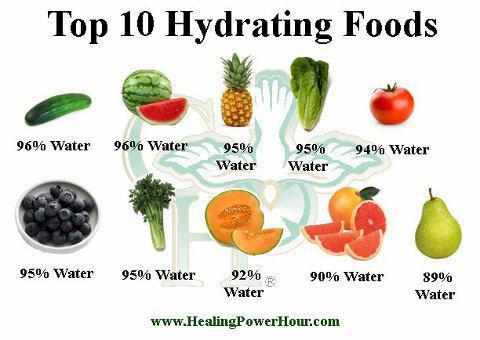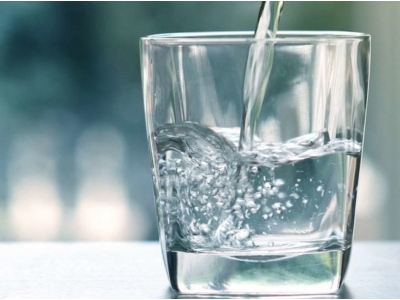Fill me up! Getting your Water Right!
Listed Under: Blog
Water, water everywhere....especially after this very wet weekend!!
Water is the most abundant substance in the human body. Effectively, we are 70% water, thickened with a bit of protein, (about 25% of the body), hung on a mineral skeleton (about 5% of the body). Wow! Makes you think right?
It has a multitude of functions to keep the body working optimally. Most biochemical reactions in the human body require their reactants to be dissolved in water; in fact, almost all molecules in the body are suspended in water so that they can be brought into contact with the other molecules for these critical human biological reaction. It is the water component of our blood, for example, that dissolves the transported oxygen and waste carbon dioxide to and from the rest of our cells. The interstitial fluid that bathes every cell in our bodies is also predominantly made up of water. And the ability of water to absorb and release heat is an important attribute for stabilising our body temperature.
Water is also important for physical functions such as absorption, lubrication and cleansing in the body. The digestive tract relies on the presence of water, using up to 8 litres a day! Wowzers! Can you imagine if we actually had to drink that much?! Lots of this volume is reabsorbed, but we need to add additional water in to replenish our hydration levels every single day. The mucus that lubricates all our mucous membranes around the body is also water-based. This is crucial where our internal organs come into contact with each other as it prevents abrasion and an associated increased risk of infection in and around all those organs of the chest and abdomen.
Drinking sufficient clean water is absolutely paramount for our health, but how much?
It is generally recommended that 6 - 8 small glasses of fresh, clean water are enjoyed throughout the day (amounting to approximately 2 litres). This can come from freshly squeezed fruit or vegetable juices if absolutely necessary, but ideally does not including any tea/coffee that we might be drinking.
"But water is so boring!" I hear you cry! Try to liven it up by adding mint, or lemon balm from the garden, or cucumber, fresh strawberries, lemon/lime/orange slices...anything that tempts you. Don't forget you can drink water hot or cold...I love nothing more than a mug of hot water (with or without a slice of lemon) when I'm feeling a bit chilly or even a bit hungry, just as a little pick-me-up. If you simply can't bear the thought of this, try caffeine-free herbal and fruit teas, but no, you don't need to add sugar!
Generally speaking it is better not to drink lots of water around mealtimes as this dilutes your digestive enzymes and stomach acid, rendering your stomach conditions less than favourable for optimal digestion. Therefore, drinking a small amount every hour flushes out toxins from the system and keeps the kidneys functioning well. There is little pint in drinking large amounts in one...you'll just wee it straight out, so give your body regular opportunities to rehydrate evenly through the day! Makes sense right?
Where shall I get my water from then?
There are 5 main sources of drinking water we can turn to :
- Tap Water
- Bottled Mineral Water
- Distilled Water
- Tank Water
- Filtered Water
Tap water is not always suitable for human consumption as it can be heavily contaminated with inorganic salts, additives or toxic chemicals. Our drinking water may come from different sources , which is also a relevant consideration; surface dam water, is treated with chlorine and fluoride. Ground water can be heavily saturated with suspended organic matter and dissolved acids (giving it a brown colour). Are these sounding tempting?
These sources of water are then cleared with alum or aluminium sulphate, a coagulant/flocculant that encourages these contaminants to aggregate. Chemical polyelectrolytes are then added to settle out the coagulated waste and sand filtration recovers these settled particles. The organic matter should then at least be gone, but what about any leftover chemical contaminants?
The risk if there are high mineral salt contents is that they can then accumulate in the tissues and cause fluid retention. Think about it....salt is used to preserve meats and fish in some cultures. Accumulation of salts in the tissues of our cardiovascular system results in hardened, inelastic arteries. Couple this with that fluid retention and the high blood pressure that results is a recipe for serious cardiovascular disease. If we want to rectify any accumulated salts in our systems, a short period of time (2-3 weeks) drinking only distilled water, draws these salts out of the tissues, and we can then switch to filtered water.
Bottled mineral water is one alternative, but one that costs money, involved plastic packaging, a hot topic nowadays, and is highly variable in mineral content. Just compare the mineral content %s next time you are waiting to pay at the petrol station next to the drinks fridge. Which one is the right mineral spectrum for you? And how are we supposed to know?
Distilled water is produced by boiling water, condensing the steam and collecting the results! It tastes sweet, is very pure and has what we term a "negative polarity" - aggressively attracting minerals and other elements towards the water molecules to 'mop up' salts and other salts which might have accumulated in our bodies. With this in mind, we should only use this for short periods of time, so that we don't lose essential minerals by leaching them from our systems too (so no more than 6 months as an absolute maximum). Once again, 6-8 small glasses is the recommended amount, taken steadily through the day, no more frequently than every half hour. Where excess salt accumulation and high BP are the causes of hypertension, this can be a spectacularly effective course of intervention. It has also been suggested for symptom management of arthritis. Distilled water is generally available for internet sources or you can instal a home distillation kit for around £150-£200.
'Tank water' is the term used for collected rain water. Whilst it is generally considered safe to drink, it's worth considering.....if you have a city home, is your roof contaminated with any urban pollutants or heavy metals? Are your roofs and gutters clean? In rural areas, what have the crops been sprayed with recently? Is this going to pose a potential contamination risk? Gone off this idea?
So this leaves probably the best option - Filtered Water. You can do this using simple and relatively inexpensive carbon filters, or more sophisticated (and expensive) carbon - argon mesh filters which also destroy any bacterial contamination. Reverse osmosis filters can give us clean water as well as managing to retain all the trace mineral content we want to keep in our water. Typically speaking the price is proportional to it's filtering efficiency, so think about what you want our water filter to do before spending lots of money. These filters are widely available in most supermarkets now as well as health stores, high street chemists and kitchen shops.

It is also worth remembering that our food contains water, so whilst we are focusing on drinking 6 - 8 glasses of water from the right sources, we may also consider any dietary changes we might have made and how these could affect our levels of hydration.
If you cut down on your carbs for example, every molecule of carbohydrate holds 3 molecules of water.. So how much might you have reduced your food-based hydration without even knowing it?
All the more important to get topping up with fresh, clean water or adding in some more water-rich foods as shown in the picture here.
If you can aim for 1ml of water for every calorie you are taking in and burning over the course of a day, that is a great aim. So it's also important to factor this in if you are exercising (eg. burning 2500 calorie a day means you should up the water intake to 2.5 litres). As your body temperature rises you also lose fluids through sweat and these drag the salts out of your system too, so hydration is a crucial part of efficient training program and you must make sure you get this right (seek advice is you need to from sports professionals and their dieticians). However, even the amateur or weekend sport enthusiast needs to understand how important it is to increase your fluid intake when exercise is becoming a new habit.
You can survive for days without food - 36 days in fact, but only for 3 days without water (and I don't recommend giving this a go just to check!)
As I often say to my children......You're not a camel, you're a human!
So get up, go to the kitchen and grab yourself a glass of what my Granny used to call "duck's gin" right now!
Cheers x


 loading...
loading...